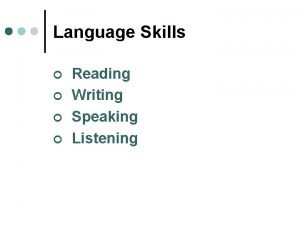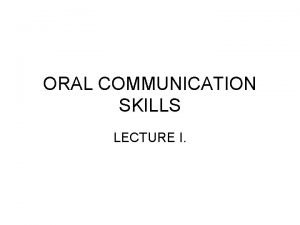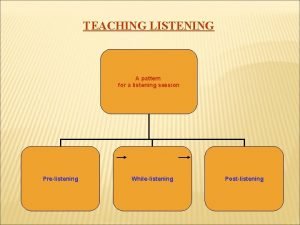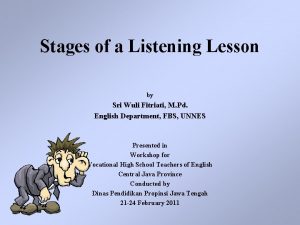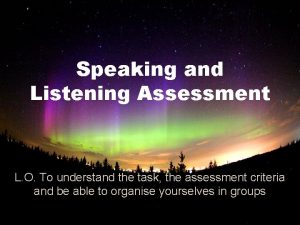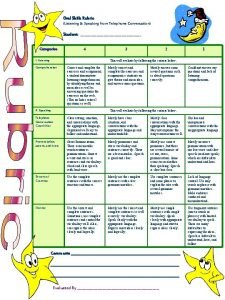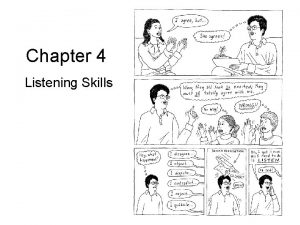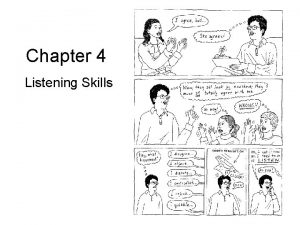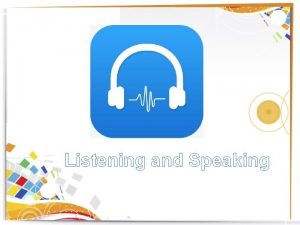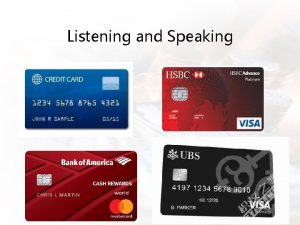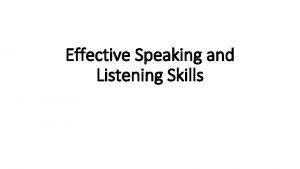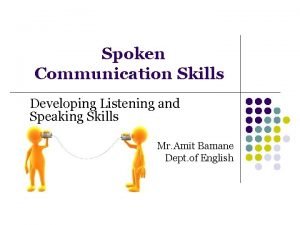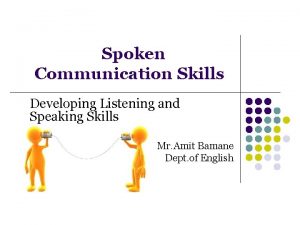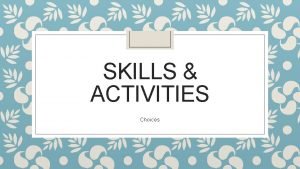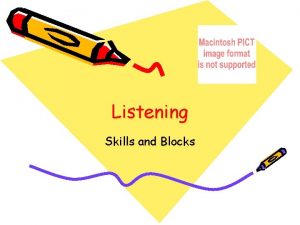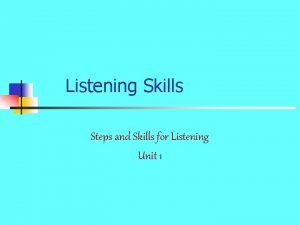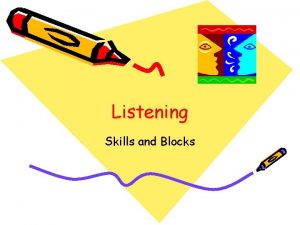Listening and Speaking Skills Ms Nazish Yasin Listening
























![Class Activity [peer assesment] • Students work in pairs • The one student has Class Activity [peer assesment] • Students work in pairs • The one student has](https://slidetodoc.com/presentation_image_h/afd8dd0badb3a0085b822665acc4a1ed/image-25.jpg)
- Slides: 25

Listening and Speaking Skills Ms. Nazish Yasin

Listening Skills • Are you a good listener? Listening is a skill that is highly valued in the workplace. When you are seeking employment, interviewers will want to know that you have the ability to listen. It's one of the soft skills that employers look for when hiring.

The Listening Process • To be a good active listener in the workplace, there are two components for success: attention and reflection. • Attentive listening includes eye contact, posture, facial expressions, gestures and genuine interest in what the person is saying. • Reflection includes repeating and paraphrasing what you have heard, showing the person that you truly understand what has been said.

What Makes a Good Listener? • Good listeners actively endeavor to understand what others are really trying to say, regardless of how unclear the messages might be. Listening involves not only the effort to decode verbal messages, but also to understand nonverbal cues such as tone of voice, facial expressions, and physical posture.

What Makes a Bad Listener? • Interfering the person you're speaking with, and talking before they have had a chance to finish what they are saying indicates that your listening skills may need polishing up. Responding with a statement that doesn't answer the question you've been asked will reflect poorly on your listening skills, especially during a job interview.

Speaking Skills

Introduction to Speaking Skills • Many students master the fine points of English grammar but find themselves at a loss when it comes to actually having a conversation with native speakers. • In reality, the only way to develop fluency in speaking is by huge amounts of listening, and then practicing. The following are a few tips for improving English speaking skills. • Don’t forget that listening is the foundation for speaking! When you also want to practice speaking, here are some suggestions for how to improve English speaking skills.

Features of Speaking Speak Clearly Develop Flow Choose Your Mastery Topics Become a Topic Master Develop Style Practice Daily

Speak Clearly • • • Being Direct and Responsible with your Meaning Speaking Loudly and Calling Attention To Yourself. Avoiding Slang, Jargon and Pop-Culture References For Example: I’m also looking at a picture of a beautiful girl who chased me down at a party month ago and made me stay up late and tell her stories until the sun popped up over the windowsill. • In this example, speak clearly. Enunciate and choose a volume as if it were on purpose. Select the easiest words to get your point across. Only once you’ve mastered clarity should you begin to braid some silvery strands into your language.

Develop Flow • • There are two aspects of flow: Pace – a speed at which something moves Pausing – a temporary stop We also need to be comfortable pausing. If I had only thirty seconds of your time to help you improve your speaking skills, I would tell you to replace all of your filler words with a two second pause. • A filler word is “uh” or “um, ” or anything you say that is equivalent. Notice whenever you use a filler word, pause for two seconds, and then continue.

Choose Your Mastery Topics • Mastery Topics are subjects that you’re interested in and passionate about. • When you discuss these topics you naturally exude more confidence and excitement, and you’re more likely to draw listeners into your world. And, since you’ll be talking about your mastery topics so much, you’ll have all of the speaking nuances of the topics covered as well. • For example: I’m passionate about living abroad, running a social skills business, general success, learning and food.

Become a Topic Master • Take a second to think about your everyday conversations. • Generally you fall into a topic that you’re comfortable with and your conversations follow similar paths. • There’s nothing wrong with this, but if we naturally do it all of the time we might as well do it on purpose. To add some flair to our speaking skills we’ll need to add some sub-topics to our Mastery Topic. • With these sub-topics we can practice our clarity, flow and style.

Develop Style The trick is to express the same words in a more appealing manner. • • • To do this, I suggest you emulate somewhere better than yourself. Consider these five skills and your ability to use them to create interest in conversation: Volume Pace Gestures Humour Story-telling With all of those skills, you use them to emphasize the words that you’re speaking. Sometimes they replace words. Instead of going on about these skills.

Practice Daily do you think that you’re going to Improve speaking skills There are two behaviors that you should build: • Practice Daily • Practice at Events

Public Speaking • Becoming a Confident, Compelling Speaker • Whether we're talking in a team meeting or presenting in front of an audience, we all have to speak in public from time to time. • We can do this well or we can do this badly, and the outcome strongly affects the way that people think about us. This is why public speaking causes so much anxiety and concern. • The good news is that, with thorough preparation and practice, you can overcome your nervousness and perform exceptionally well.

The Importance of Public Speaking Even if you don't need to make regular presentations in front of a group, there are plenty of situations where good public speaking skills can help you advance your career and create opportunities. For example, • you might have to talk about your organization at a conference, • make a speech after accepting an award, or teach a class to new recruits. • Speaking to an audience also includes online presentations or talks; for instance, when training a virtual team, or when speaking to a group of customers in an online meeting.


Plan Appropriately • First, make sure that you plan your communication appropriately. • When you do this, think about how important a book's first paragraph is; if it doesn't grab you, you're likely going to put it down. The same principle goes for your speech: from the beginning, you need to intrigue your audience. • For example, you could start with an interesting statistic, headline, or fact that pertains to what you're talking about and resonates with your audience.

Practice • There's a good reason that we say, "Practice makes perfect!" You simply cannot be a confident, compelling speaker without practice. • If you're going to be delivering a presentation or prepared speech, create it as early as possible. The earlier you put it together, the more time you'll have to practice.

Engage With Your Audience • When you speak, try to engage your audience. This makes you feel less isolated as a speaker and keeps everyone involved with your message. If appropriate, ask leading questions targeted to individuals or groups, and encourage people to participate and ask questions. • Keep in mind that some words reduce your power as a speaker. For instance, think about how these sentences sound: "I just want to add that I think we can meet these goals" or "I just think this plan is a good one. " The words "just" and "I think" limit your authority and conviction. Don't use them. • Finally, avoid reading word-for-word from your notes. Instead, make a list of important points on cue cards, or, as you get better at public speaking, try to memorize what you're going to say – you can still refer back to your cue cards when you need them.

Pay Attention to Body Language • If you're unaware of it, your body language will give your audience constant, subtle clues about your inner state. If you're nervous, or if you don't believe in what you're saying, the audience can soon know. • Pay attention to your body language: stand up straight, take deep breaths, look people in the eye, and smile. Don't lean on one leg or use gestures that feel unnatural.

Think Positively • Positive thinking can make a huge difference to the success of your communication, because it helps you feel more confident. • Use positive affirmations such as "I'm grateful I have the opportunity to help my audience" or "I'm going to do well!"

Cope With Nerves • First, make an effort to stop thinking about yourself, your nervousness, and your fear. Instead, focus on your audience: what you're saying is "about them. " Remember that you're trying to help or educate them in some way, and your message is more important than your fear. Concentrate on the audience's wants and needs, instead of your own.

Watch Recordings of Your Speeches • Whenever possible, record your presentations and speeches. You can improve your speaking skills dramatically by watching yourself later, and then working on improving in areas that didn't go well. • As you watch, notice any verbal stalls, such as "um" or "like. " Look at your body language: are you swaying, leaning on the podium, or leaning heavily on one leg? Are you looking at the audience? Did you smile? Did you speak clearly at all times? • Pay attention to your gestures. Do they appear natural or forced? Make sure that people can see them, especially if you're standing behind a podium. • Last, look at how you handled interruptions, such as a sneeze or a question that you weren't prepared for. Does your face show surprise, hesitation, or annoyance? If so, practice managing interruptions like these smoothly, so that you're even better next time.
![Class Activity peer assesment Students work in pairs The one student has Class Activity [peer assesment] • Students work in pairs • The one student has](https://slidetodoc.com/presentation_image_h/afd8dd0badb3a0085b822665acc4a1ed/image-25.jpg)
Class Activity [peer assesment] • Students work in pairs • The one student has to give presentation and the second has to give remarks on it that whether he or she is presenting according to the skills of presentation or not.
 Listening reading writing speaking
Listening reading writing speaking Conclusion for communication
Conclusion for communication Pre while post listening
Pre while post listening Stages of listening lesson
Stages of listening lesson Telpas writing rubric
Telpas writing rubric Telpas 4 point speaking rubric
Telpas 4 point speaking rubric Speaking and listening success criteria
Speaking and listening success criteria Listening and speaking 3
Listening and speaking 3 Speaking and listening: effective group discussions
Speaking and listening: effective group discussions Listening and speaking rubric
Listening and speaking rubric Action plan for active listening
Action plan for active listening Yus ibnu yasin
Yus ibnu yasin Sevtap yasin
Sevtap yasin The story of the believer of yasin family
The story of the believer of yasin family Yasin 33
Yasin 33 Zafar yasin
Zafar yasin Mert yasin öz kimdir
Mert yasin öz kimdir Yasin yildirim
Yasin yildirim Dr yasin bayram
Dr yasin bayram Zaki yasin architect
Zaki yasin architect Cerpen adalah
Cerpen adalah Dr yasin bayram
Dr yasin bayram Tartil surat yasin
Tartil surat yasin Grammar listening speaking reading writing
Grammar listening speaking reading writing Grammar listening speaking reading writing
Grammar listening speaking reading writing Grammar listening speaking reading writing
Grammar listening speaking reading writing
